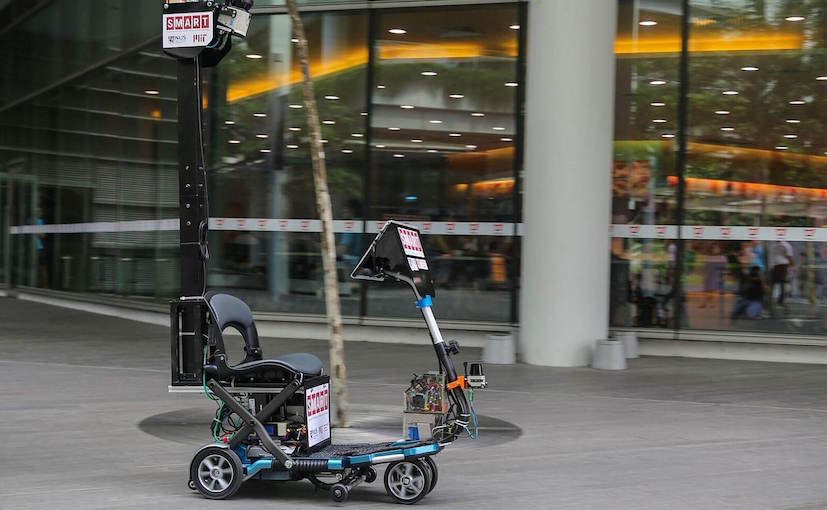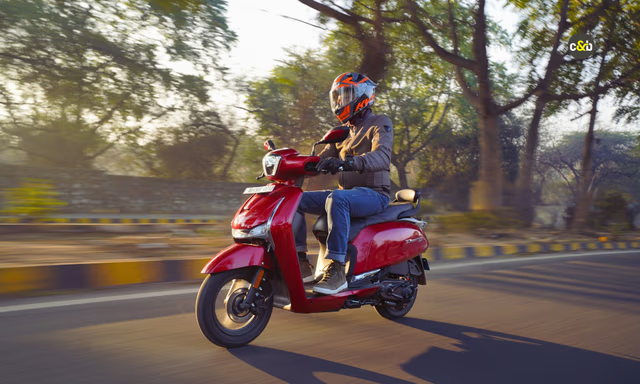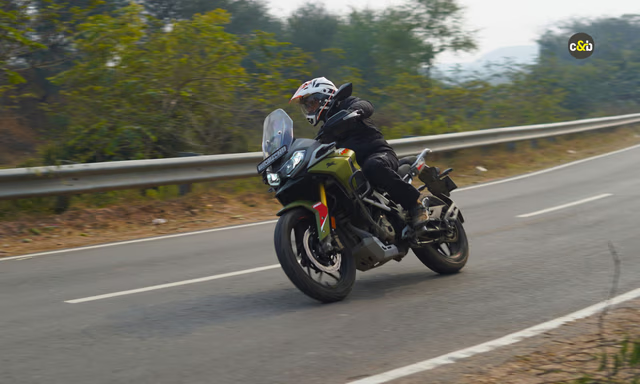Self-Driving Mobility Scooters Could Soon Be Reality
Reuters
1 min read
Nov 23, 2016, 05:59 PM

Key Highlights
- The self driving scooter is intended to drive pedestrians on footpaths
- The self driving mobility scooter can travel at speeds up to 6 km/h
- The self-driving scooter is still in the testing phase
After self-driving cars making it on roads, it could be self-driving mobility scooters that might just turn out to be the next big thing. Researchers in Singapore has come out with self-driving mobility scooters that drive single pedestrians along footpaths. The innovation has emerged out of the need to curb accidents involving phone-obsessed walkers, who are more vulnerable to bump into things due to the lack of attention. That said, it will be of great aid to the elderly too.
So, the one-seater, four-wheel, 50 kg vehicle is capable of travelling at a top speed of 6 km/h and has laser sensors to help navigate around obstacles. It slows down when it detects obstacles up to 4 km/h in front of it and has a 0.2 second response time.
The scooter is developed by the National University of Singapore (NUS), the city-state's latest experiment with driverless vehicles as it pushes ahead with its vision of using autonomous technology to help deal with the challenges of its limited land and labour. The mobility scooter has undergone successful tests on campus and developers said it can help improve mobility for all ages, cut down on the need for cars and also lower accident rates.
NUS Associate Professor and project leader Marcelo Ang Jr said, "I'm sure you have experienced people who just use their handphone while walking, and almost run into you ... so it would be nice if you are just sitting down and checking your emails. "We just give you more choices."
Ang Jr said that the scooter would be able to work in tandem with other driverless vehicles in Singapore, where robo-taxis are being tested and trials are planned for self-driving buses. He said the scooter was meant for use on narrow pathways which larger vehicles cannot access. Currently, the scooter takes a few seconds to calibrate a different route when it nears an obstacle - something Ang Jr said the team was looking to improve.
Users, though, did not seem too bothered by the brief pause. "It goes really smoothly and travels very safely," said student Kevin Xiangyu Hui, who tested the scooter. The project, a collaboration between the Massachusetts Institute of Technology (MIT), Singapore-MIT Alliance for Research and Technology (SMART), and NUS will be further tested and is not for sale. a
So, the one-seater, four-wheel, 50 kg vehicle is capable of travelling at a top speed of 6 km/h and has laser sensors to help navigate around obstacles. It slows down when it detects obstacles up to 4 km/h in front of it and has a 0.2 second response time.
The scooter is developed by the National University of Singapore (NUS), the city-state's latest experiment with driverless vehicles as it pushes ahead with its vision of using autonomous technology to help deal with the challenges of its limited land and labour. The mobility scooter has undergone successful tests on campus and developers said it can help improve mobility for all ages, cut down on the need for cars and also lower accident rates.
NUS Associate Professor and project leader Marcelo Ang Jr said, "I'm sure you have experienced people who just use their handphone while walking, and almost run into you ... so it would be nice if you are just sitting down and checking your emails. "We just give you more choices."
Ang Jr said that the scooter would be able to work in tandem with other driverless vehicles in Singapore, where robo-taxis are being tested and trials are planned for self-driving buses. He said the scooter was meant for use on narrow pathways which larger vehicles cannot access. Currently, the scooter takes a few seconds to calibrate a different route when it nears an obstacle - something Ang Jr said the team was looking to improve.
Users, though, did not seem too bothered by the brief pause. "It goes really smoothly and travels very safely," said student Kevin Xiangyu Hui, who tested the scooter. The project, a collaboration between the Massachusetts Institute of Technology (MIT), Singapore-MIT Alliance for Research and Technology (SMART), and NUS will be further tested and is not for sale. a
Latest News
 car&bike Team | Feb 24, 2026Mercedes-Benz CLA Electric Debuts In India: Bookings Open March 10This is the first time the CLA nameplate will be offered in an electric derivative with the EV claimed to offer 792km WLTP range.3 mins read
car&bike Team | Feb 24, 2026Mercedes-Benz CLA Electric Debuts In India: Bookings Open March 10This is the first time the CLA nameplate will be offered in an electric derivative with the EV claimed to offer 792km WLTP range.3 mins read car&bike Team | Feb 24, 2026Jeep Wrangler Willys 41 Special Edition Reintroduced: Priced At Rs 70.31 LakhThe Wrangler in this edition wears a military green paint scheme and is limited to just 41 units across India.1 min read
car&bike Team | Feb 24, 2026Jeep Wrangler Willys 41 Special Edition Reintroduced: Priced At Rs 70.31 LakhThe Wrangler in this edition wears a military green paint scheme and is limited to just 41 units across India.1 min read Jafar Rizvi | Feb 24, 2026New-Gen Toyota Fortuner Spied For The First TimeThe existing Toyota Fortuner has completed nearly a decade in India, and we could expect the new-gen SUV to make its India debut in 2027.3 mins read
Jafar Rizvi | Feb 24, 2026New-Gen Toyota Fortuner Spied For The First TimeThe existing Toyota Fortuner has completed nearly a decade in India, and we could expect the new-gen SUV to make its India debut in 2027.3 mins read Jaiveer Mehra | Feb 23, 2026Skoda Kushaq Facelift Production Commences Ahead Of LaunchThe facelifted Kushaq made its global debut last month with deliveries set to commence from March 2026.1 min read
Jaiveer Mehra | Feb 23, 2026Skoda Kushaq Facelift Production Commences Ahead Of LaunchThe facelifted Kushaq made its global debut last month with deliveries set to commence from March 2026.1 min read Jaiveer Mehra | Feb 23, 20262026 Isuzu D-Max Hi-Lander Launched At Rs 21.05 Lakh; Gets Automatic Gearbox Option, More FeaturesThe Hi-Lander continues to only be offered in 4x2 spec, but now packs in similar features as the base-spec V-Cross.1 min read
Jaiveer Mehra | Feb 23, 20262026 Isuzu D-Max Hi-Lander Launched At Rs 21.05 Lakh; Gets Automatic Gearbox Option, More FeaturesThe Hi-Lander continues to only be offered in 4x2 spec, but now packs in similar features as the base-spec V-Cross.1 min read car&bike Team | Feb 23, 2026KTM Ends Long-Term Partnership With KISKA DesignWith Bajaj Auto now the owner of KTM, the Austrian brand is shifting to in-house design but will still work with KISKA on some projects.1 min read
car&bike Team | Feb 23, 2026KTM Ends Long-Term Partnership With KISKA DesignWith Bajaj Auto now the owner of KTM, the Austrian brand is shifting to in-house design but will still work with KISKA on some projects.1 min read
 Preetam Bora | Feb 24, 2026Hero Destini 110 Review: Simplicity, RefinedThe Hero Destini 110 is a no-nonsense commuter that is simple, comfortable and above all, fuel efficient. In 2026, when buyers are spoilt for choice, is it good enough to consider?1 min read
Preetam Bora | Feb 24, 2026Hero Destini 110 Review: Simplicity, RefinedThe Hero Destini 110 is a no-nonsense commuter that is simple, comfortable and above all, fuel efficient. In 2026, when buyers are spoilt for choice, is it good enough to consider?1 min read Preetam Bora | Feb 23, 2026TVS Apache RTX Road Test Review: Redefining the Entry-Level ADVAfter spending some time with the TVS Apache RTX in traffic, the daily commute, as well as on open highways, one thing becomes clear: the RTX is trying to redefine the entry-level ADV segment. But is it without fault?1 min read
Preetam Bora | Feb 23, 2026TVS Apache RTX Road Test Review: Redefining the Entry-Level ADVAfter spending some time with the TVS Apache RTX in traffic, the daily commute, as well as on open highways, one thing becomes clear: the RTX is trying to redefine the entry-level ADV segment. But is it without fault?1 min read Girish Karkera | Feb 20, 2026Road Test: 2025 VinFast VF7 AWD Sky InfinityFlagship all-electric SUV from the Vietnamese car maker gets most of the basics right.1 min read
Girish Karkera | Feb 20, 2026Road Test: 2025 VinFast VF7 AWD Sky InfinityFlagship all-electric SUV from the Vietnamese car maker gets most of the basics right.1 min read Jaiveer Mehra | Feb 18, 2026New BMW X3 30 Vs Mercedes-Benz GLC 300: Midsize Luxury SUV FaceoffWith the new X3 30, BMW has a direct competitor to the petrol GLC 300, but which is the luxury SUV for you?1 min read
Jaiveer Mehra | Feb 18, 2026New BMW X3 30 Vs Mercedes-Benz GLC 300: Midsize Luxury SUV FaceoffWith the new X3 30, BMW has a direct competitor to the petrol GLC 300, but which is the luxury SUV for you?1 min read Jafar Rizvi | Feb 15, 2026Maruti Suzuki Victoris: Long-Term Review - Report 1The Victoris is Maruti’s latest offering for the Indian market, and after spending some time with it, here are a few early impressions.1 min read
Jafar Rizvi | Feb 15, 2026Maruti Suzuki Victoris: Long-Term Review - Report 1The Victoris is Maruti’s latest offering for the Indian market, and after spending some time with it, here are a few early impressions.1 min read





















































































































